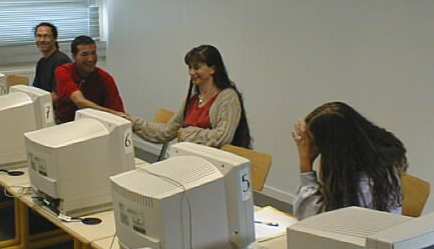
West Virginia University in Vendée, France


In Europe for a conference in Great Britain, our colleague Dr. Twyla Meding and
her husband Dr. Jeffrey Bruner, have come to Les Sables to join us for the last class
session of WVU-V 1998. Above Brian Hibbs greets Dr. Meding as she takes a seat to
hear some of today's culture and communication reports.
Below, Shelley Albright reports on the art of the baker in France. Shelley has visited a small neighborhood bakery in Les Sables and has come away with a true sense of the pride that the French baker brings to his or her work. Among her essential discoveries is the critical distinction between the words "artisanal" ("handmade") and "industriel" ("mass produced") that are used to describe the process by which French bread is produced. The French, of course, find individually produced bread far superior to the mass produced loaves one finds in supermarkets or in "fake bakeries". One question Shelley asked in her interview was "How do the French eat so much bread and still remain so slim?" This baker's answer was that the French have an extremely varied diet, and they consume fresh products (vegetables, meats, and of course bread baked daily). Last, but not least, is the fact that the French take the time to enjoy their meals and to digest properly.
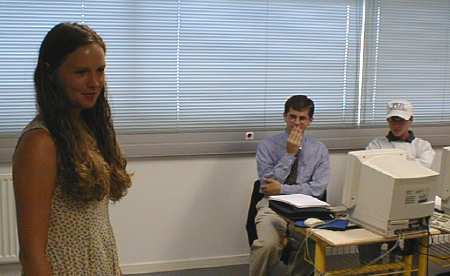
Betsy Goosman then delivered her findings on the development of the tourism industry in Les Sables. Among the major points she raised were evolution of transportation (trains and cars) over the last 150 years and the 1936 French law concerning paid vacations. By the 1950's hotels, vacation apartments, and tourist agencies had evolved to a state that made vacation travel in France a fundamental part of the national identity. This week, for example, is the first week of "les vacances" in France, and the beaches and streets here have changed completely since only a few days ago. Les Sables has grown from a sleepy fishing town into a vacation metropolis with tens of thousands of new inhabitants, most arriving over the past weekend.
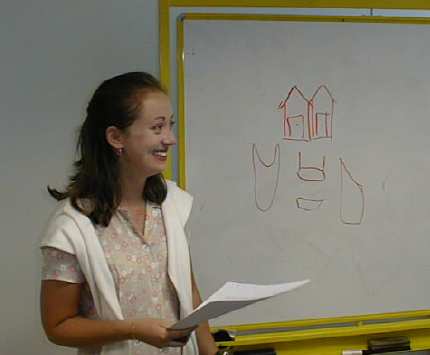
Julian Brayman follows Betsy with a discussion of the stock market and the evolution of the French investment system. Julian has interviewed Monsieur Vignon, an investment banker at the Crédit Mutuel, in order to get an inside look at this important part of French life. One observation Julian makes is that the French tend to be more conservative and less speculative in their investments than Americans, a fact that may explain the steadier, but sometimes slower, growth line of the French economy when compared with the American market which is marked by periods of rapid growth and sometimes rapid drops or even crashes as in 1929. Julian also discussed the arrival of the new currency called the Euro, which will replace the French franc and other national currencies during the course of the next few years. In fact, when the 1999 WVU-Vendéens arrive, the Euro will be the official currency here, although our francs may still be used until January 2002.
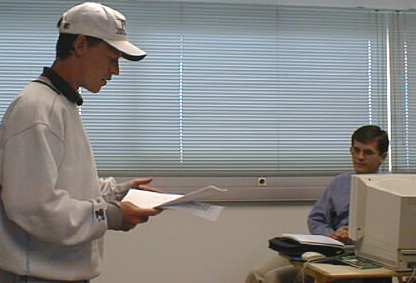
Amanda Walker's report centered on medical studies in France. She noted that admission to medical school is based on a system of "concours" or competitive exams for a fixed number of places, the number being determined each year by the nation's needs. Below, we see that in 1982 there were 6,400 seats available in France's medical schools, as compared to 3,500 in 1993. Amanda also pointed out that after medical school and internship, 70% of France's physicians enter individual practice, the rest being salaried professionals working for medical schools, hospitals, laboratories, the school system, etc. With its 175,000 practicing physicians, France is one of the most "medicalized" countries in the world. Amanda interviewed two French doctors, married to each other, in order get a direct view of the life of French physicians. Before leaving the States, Amanda had posed some of the same questions she used here to a small number of American doctors. We were a bit surprised by her observation that the Americans were largely unhappy with their choice of profession while the French doctors were very pleased with the life they had chosen.
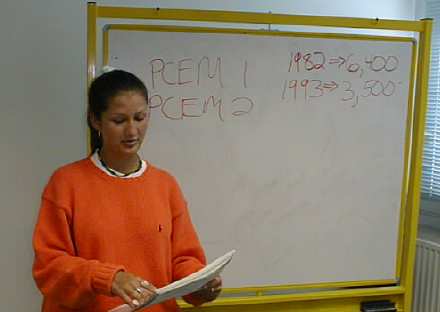
Our thoughts then turned from medicine to education as Brian Hibbs took the floor. One of the works on French education that Brian consulted had focused on two types of learning strategies adopted by most students. This work divided students into the "dependent" type (who is fixed upon the text and or the teacher) and the "independent" type (who prefers learning from sources beyond those offered in the classroom). Brian identified another category which he calls the "interdependent" type, or students who use each other as sources for learning. Brian's interview was with a teacher of English in a local high school. Among the things he learned is the fact that a "concours" is also used to select teacher in France. Each year the number of posts needed it calculated and those with the highest results on the national exam are offered positions around the country, the highest achievers being granted the first choice of the school where they will teach.
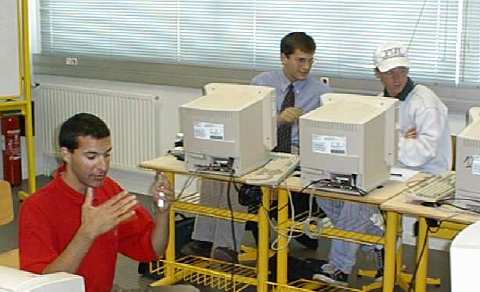
Eric Peters then returned our attention to the French medical system. One
of his fundamental observations was that from the beginning of medical school the French
approach is to focus as much on the person as on the illness. He also noted that his
interview with a French doctor revealed a strong preference for natural medicines over
chemically produced ones. Eric also noted that malpractice suits seem to be much
less frequent in France than in the US, a fact that may play a role in the relatively
lower morale of American doctors noted by Amanda Walker. Eric then went on to
discuss the national health system in France, a system which covers almost the entire
French population. Given that the French system is nationwide, patients in French
are free to choose any doctor in the country. Generalists and specialists generally
run their practices independently and may set their own fees. National health
coverage ("sécurité sociale") then reimburses patients according to set
scales. Eric also asked why French doctors continue to make house calls, a practice
almost lost in the US. The answer was simply that French doctors consider it poor
medicine to have ill patients leave their homes when often their most basic need is to be
home in bed. Maybe this simple philosophy is the key to the fact that the French
have a significantly higher life expectancy than their American counterparts.
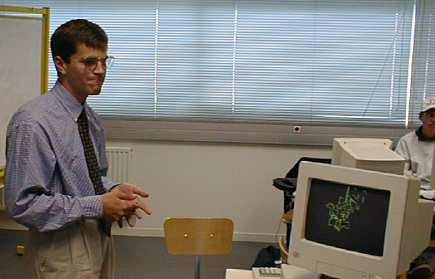
Eric's fascinating report concluded the official program of WVU-V 1998. Several of our Neo-Vendéens have already left for home of for futher travel in Europe and elsewhere, and this afternoon or tomorrow most all our students will be leaving Les Sables. Plans are now underway for 1999, and this afternoon, in the company of Doctors Meding and Bruner, we visited the Château de Talmont, a site dating back to around 1050 and which lies just a few miles outside Les Sables. Unable to visit this historic castle last year, we couldn't program it for 1998, but it will perhaps be a part of our calendar next year.
And speaking of 1999, I know that Dr. V. Lastinger joins me in hoping that our next WVU-V will be as rich and exciting as that of 1998. We can only pray that we will be as lucky as we were this year in finding the wonderful participants that made this such an unforgettable experience. As ambassadors of West Virginia University, the 1998 WVU-Vendéens have made many friends and touched many hearts in this land of beauty and charm, this land of the shimmering light of Mélusine... They have seen things they had only studied in books, and they have lived a while in a world they had perhaps not even dreamed. We hope that that world, which they have made a little better by their presence, will be forever a part of each WVU-Vendéen.
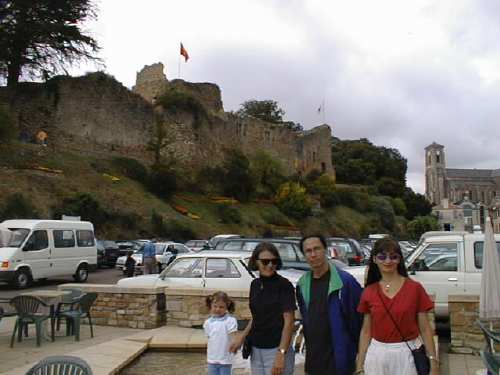
Signing off for WVU-V 1998,
au revoir et à l'année prochaine!
Michael Lastinger